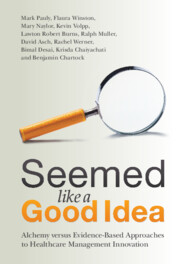 Seemed Like a Good Idea
Seemed Like a Good Idea Published online by Cambridge University Press: 14 July 2022
“Fragmentation” – the breakdown in communication among many providers treating a single patient, such that multiple decision makers make a set of health care decisions that would be made better through unified decision-making1 – is frequently cited as a major problem in the US health care system.2 It plagues both the payment system (which has multiple payers) as well as the delivery system (which has siloed providers). This chapter focuses on the latter problem of fragmentation among care providers and calls to correct it via “care coordination.” The problem is not just provider fragmentation, however. It is also the lack of clarity regarding what care coordination (the proposed solution) means, what benefits it confers, and how to do it.
To save this book to your Kindle, first ensure no-reply@cambridge.org is added to your Approved Personal Document E-mail List under your Personal Document Settings on the Manage Your Content and Devices page of your Amazon account. Then enter the ‘name’ part of your Kindle email address below. Find out more about saving to your Kindle.
Note you can select to save to either the @free.kindle.com or @kindle.com variations. ‘@free.kindle.com’ emails are free but can only be saved to your device when it is connected to wi-fi. ‘@kindle.com’ emails can be delivered even when you are not connected to wi-fi, but note that service fees apply.
Find out more about the Kindle Personal Document Service.
To save content items to your account, please confirm that you agree to abide by our usage policies. If this is the first time you use this feature, you will be asked to authorise Cambridge Core to connect with your account. Find out more about saving content to Dropbox.
To save content items to your account, please confirm that you agree to abide by our usage policies. If this is the first time you use this feature, you will be asked to authorise Cambridge Core to connect with your account. Find out more about saving content to Google Drive.